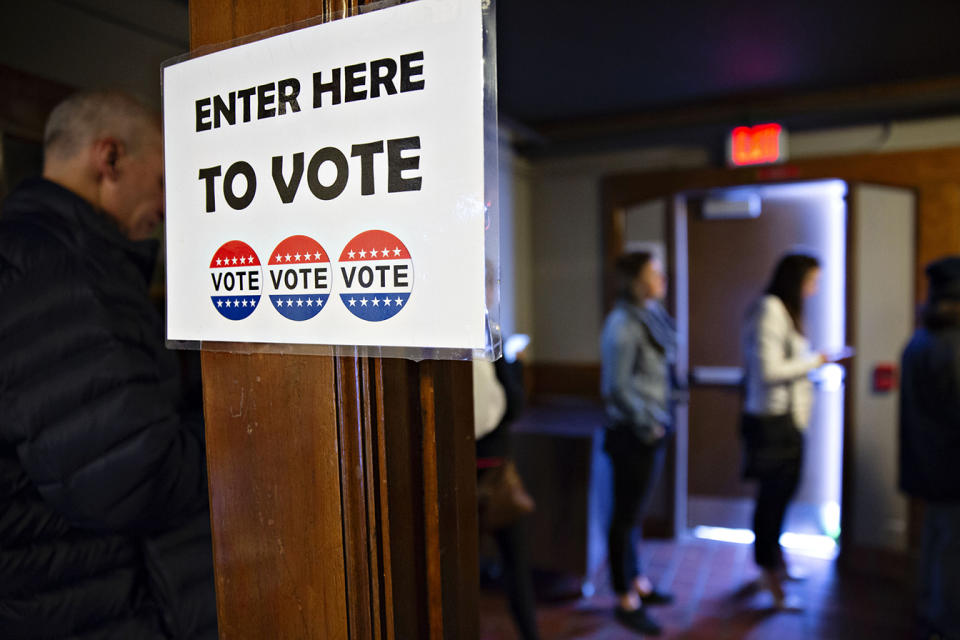Both parties gear up for ballot access fight in Wisconsin
Welcome to 2020 Vision, the Yahoo News column covering the presidential race with one key takeaway every weekday and a wrap-up each weekend. Reminder: There are 42 days until the Iowa caucuses and 316 days until the 2020 election.

A leaked recording of a top Trump campaign adviser has raised concerns about ballot access in Wisconsin, likely to be a key swing state in the 2020 presidential election.
According to an audio recording acquired by the AP, Justin Clark, a senior political adviser and counsel to Trump’s reelection campaign, told Republicans in Wisconsin that the party needed to begin “playing offense a little bit” and “start protecting our voters.”
“Traditionally it’s always been Republicans suppressing votes in places,” Clark said at the November meeting of the Republican National Lawyers Association’s Wisconsin chapter. “Let’s start protecting our voters. We know where they are. ... Let’s start playing offense a little bit. That’s what you’re going to see in 2020. It’s going to be a much bigger program, a much more aggressive program, a much better-funded program.”
Clark’s comments were interpreted by some as an admission that his party had practiced voter suppression over the years. But when asked about his remarks by the AP, Clark said he was talking about false accusations.
“As should be clear from the context of my remarks, my point was that Republicans historically have been falsely accused of voter suppression and that it is time we stood up to defend our own voters,” Clark said. “Neither I nor anyone I know or work with would condone anyone’s vote being threatened or diluted and our efforts will be focused on preventing just that.”
Top Republican officials had previously touted strict voter ID laws as a reason for their success in the state.
“We battled to get voter ID on the ballot for the November ’16 election,” said former Wisconsin Attorney General Brad Schimel in an April 2018 interview with a conservative radio outlet. “How many of your listeners really honestly are sure that [Republican Sen. Ron] Johnson was going to win reelection or President Trump was going to win Wisconsin if we didn’t have voter ID to keep Wisconsin’s elections clean and honest and have integrity?”
Trump won Wisconsin by just under 23,000 votes in 2016, the first time the state had voted for a Republican presidential candidate since Ronald Reagan in 1984. After losing both the presidential and Senate races in 2016, Democrats found some success in the 2018 midterms with incumbent Democratic Sen. Tammy Baldwin winning by 11 points and challenger Tony Evers edging incumbent Republican Scott Walker for the governor's mansion. A presidential preference poll from the Marquette Law School earlier this month showed a tight contest, with Trump and his potential Democratic challengers in 1- or 2-point races, well within the margin of error.
Trump and his allies have continually pushed conspiracies about millions of illegal votes, defending strict voter ID laws that tend to suppress minority votes. (One study of Wisconsin, where turnout was down 3.3 percent from 2012 to 2016, found that the ID law disproportionately affected black voters.) A comprehensive 2014 report examining years of elections turned up 31 instances of credible fraud out of 1 billion votes cast. There have been limited documented cases of voter fraud in the 2016 election. A White House commission to study voter fraud shut down without issuing a report after it received bipartisan pushback from across the country.
“It is vital that Wisconsinites have free and fair access to the polls, and that we protect the security and integrity of our elections,” Josh Kaul, the state’s Democratic attorney general, said in a statement in reaction to Clark’s comments. “The Wisconsin Department of Justice has been and will continue working with other agencies to protect our democratic process.”
Earlier this year, a Wisconsin judge ordered 200,000 voters who did not respond to a letter to be purged from the rolls. An appeal is expected to reach the Republican-controlled state Supreme Court. State Democratic Party chairman Ben Wikler responded by stating that his team planned to work to reregister Democrats who had fallen off the rolls.
“This is an organizing challenge, not a crisis,” Wikler said. He said purging the voters “just adds to our to-do list. It’s a reason to work, not to freak out.”
_____
Read more from Yahoo News:




